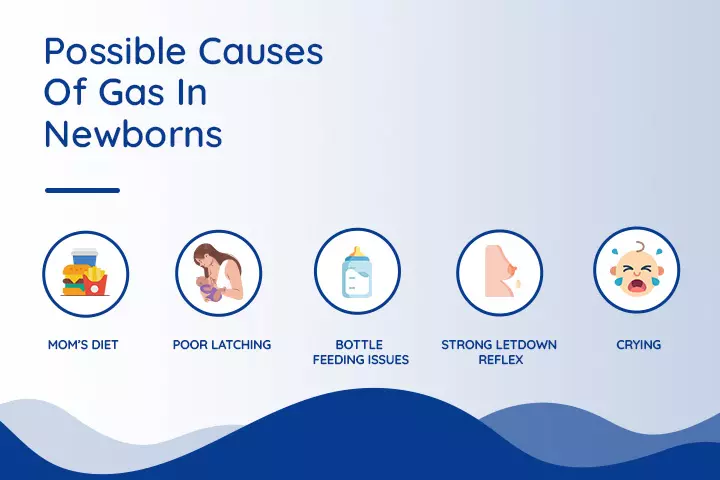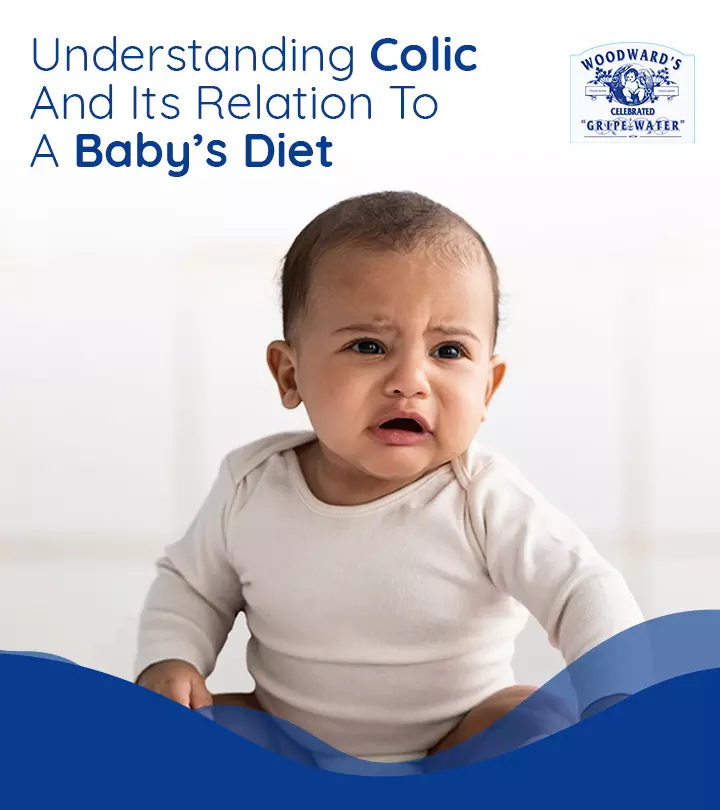

Image: Shutterstock
Does your baby look uncomfortable after feeding or try to pull up their legs to the chest? Do they tend to cry a lot post feeding sessions? Do they get red in the face while crying? Welcome to parenthood. Babies can cry for a lot of reasons but one of the most common reasons for their discomfort is gas. Babies may become gassy after swallowing air during feeds or when crying. Although gas is just air trapped in their little tummies, for newborns and babies it can be painful. Breastfeeding moms often tend to link gassy babies to foods that they eat. Although food may have a role to play, there are other factors too that contribute towards gas formation in those little tummies. Moms may also begin to worry if their babies are colicky. It is good to keep in mind that if your baby cries for more than 3 hours, 3 times a week for 3 weeks, only then experts may classify it as colic pain. So, to know more about the possible causes of gas formation in your baby’s tummy and how to provide symptomatic relief, read on.
Possible Causes of Gas In Newborns
Mom’s Diet:
Breastfed babies get nourishment from their mother’s milk. While there have been many studies on this topic, research does show that some babies might be sensitive to the dairy products in a breastfeeding mother’s diet.
Poor Latching:
Proper latching includes your baby having most of your areola in their mouth. However, if your baby is unable to latch properly, they take in air with the feed that accumulates in the little tummy as gas. This trapped air might lead to pain and discomfort, resulting in a crying and unsettled baby.
Bottle Feeding Issues:
When fed with the help of a bottle, expressed breast milk can also lead to gas. This might happen when you use a nipple with a big hole or one that does not fit the baby’s mouth properly, resulting in them gulping in air along with their feed.
Strong Letdown Reflex:
If your milk flow is faster than what your baby can suck, they tend to gulp milk more quickly to keep up with the pace. In doing this, they also end up swallowing some air, which gets trapped in the tummy as gas.
Crying:
Babies do tend to cry a lot. This is because they can only express their needs through crying. Be it when they are hungry, feeling hot, or feeling dirty in diapers, crying is their way of alerting you to tend to their needs. However, when babies cry, they also tend to swallow some air, which might get trapped in their tummies leading to gas formation.
What You Can Do About It
Consult A Dietician:
If you feel that the foods you are consuming are leading to gas formation and discomfort in your newborn, consult a dietitian or a doctor for advice on what to consume and what to avoid. Do not make changes to your food pattern based on assumptions, as you might miss out on necessary nutrients for you and your little one.
Burp Your Baby Correctly:
Placing your baby on the shoulder and gently tapping their back after each feed is a gentle yet effective way to burp your baby. You can also burp your baby in an upright position by making them bend forward a little at the waist and gently tap their back. Further, burping in between feeds by taking a break is advisable for babies suffering from gas pain.
Move Their Legs In A circle:
Lay your baby on the back and gently cycle their legs in bicycle motions towards their tummy. This exercise can help release gas manually. Alternatively, you can gently push the baby’s knees towards their tummy. Hold for 10 seconds and release.
Include Tummy Time:
Tummy times benefit babies in numerous ways. It helps release trapped gas and also helps strengthen the neck and upper body. For tummy time, you need to keep your little one on their tummies when they are awake, allowing them to move around in that position.
Massage Their Belly:
Gently massaging the area around the baby’s navel in clockwise and anticlockwise motion can help relieve trapped gas. However, one should be careful to apply only gentle pressure and keep watching the baby’s reaction to avoid any excess pressure.
Try Gripe Water:
Gripe water is a liquid supplement with a combination of Sarjikakshara and Dill Seed oil that aids digestion and helps provide symptomatic relief from stomach pain caused due to gas, acidity and indigestion. It is always recommended to consult the pack regarding dosage and administration.
It is normal for babies to be gassy, but it is natural to want to know how to comfort the little one during these painful episodes. For most babies, these episodes reduce with time, and they develop a strong digestive system. However, if your baby experiences prolonged periods of distress or you see unusual behavior, don’t hesitate to contact your pediatrician.
Community Experiences
Join the conversation and become a part of our nurturing community! Share your stories, experiences, and insights to connect with fellow parents.
Read full bio of Dr. Reema Pandya


















